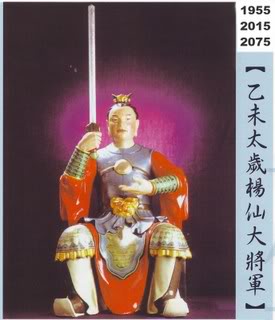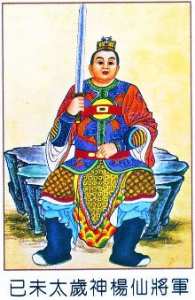

Two images of Yi-Wei Tai-Sui Yang Xian Da Jiang-Jun
.

Tai-Sui Yang-Xian’s “spirit name” amulet
.
The 60 year Stem-and-Branch Cycle (and indeed, every cycle of time) is governed by a series of 60 star-deities with the title “Tai Sui,” roughly meaning “Great Year.” Each is a “Great General” by military title, and carries the honorific nobility title “Grand Duke.”
The Tai-Sui “star” is a virtual position that moves through the heavens in the opposite direction as Jupiter (which the Chinese call Mu Xing, meaning “Wood Star”). This year, Tai Sui is calculated to be in the region of the zodiac associated with the Branch “Wei”, and that is what makes this the Year of the Sheep.
As Mu Xing rules remembrance of the past and dedication to the future, Tai Sui rules the state of the present, with all its complexities, opportunities, and dangers. On the ninth day of the New Year, he is appealed to, asking him to be merciful in his judgements and generous in his blessings. Any offering is appropriate, as long as it is made with humility, calm intention, and clear thought. It’s also thought to be perfectly suitable to make any request you may be aiming for in the year, though the traditional warning is equally suitable: “Be careful what you ask for….”
This practice is regarded as most important for those who may inadvertently make offense to the Grand Duke. Those born in the Year of the Sheep are this year at particular risk of doing so. Those born in the Years of Ox, Rat, Dragon, and Dog are also in an awkward position this year, and could clearly benefit from Tai-Sui’s good graces. For those who want to take the practice that seriously, making offering to Tai-Sui on every Sheep Day through the year is regarded as highly appropriate as well. This would be particularly important for those born in the Year of the Sheep. After the first offering has been made, displaying his image or amulet is regarded as helpful, and serves to keep your attention clear and your spirit calm, and to keep your responsibilities in proper focus.
Each of the 60 Tai-Sui deities is an example of the Daoist image of spiritual transformation, which is to say: an actual human being who has been recognized for their true-heartedness, valor, or spiritual dedication, and who has therefore been raised to a celestial status after death. Yang Xian (杨仙), for instance, lived in the Song Dynasty, and was renowned as a traveling hermit, who loved traversing mountainous country, and cavorting will all sorts of wild animals including leopards and tigers. He regarded the concerns of the materialistic world as completely superficial, and embodied the perfect image of a Mountain Immortal, passing through the world without attachment, rancor, or fear. His unclouded vision gave him the ability to predict future events with undeniable accuracy, and his speech was invariably crisply phrased and exactly to the point. At the end of his time in human form, he announced—during a wine-drinking session with his host—his will to depart the world, and he left his body without pain or suffering the following night. An official arriving shortly after his burial opened his grave to examine his remains, and found the grave empty.
The traditional image of Yang Xian shows him seated on the Tai-Sui Throne in his imperial military court dress, holding up a double-edged sword in his right hand (symbolizing clear vision, proper discrimination, and authoritative judgement), and holding his left hand palm-upwards in a meditation position, either in front of the Dan Tian just below the waist, or just below the Heart in front of the chest.
.

Leave a comment
Comments feed for this article